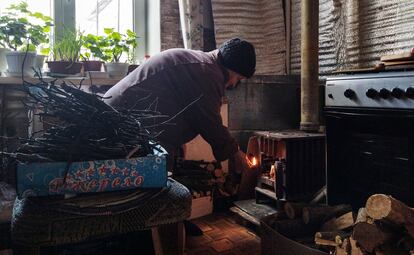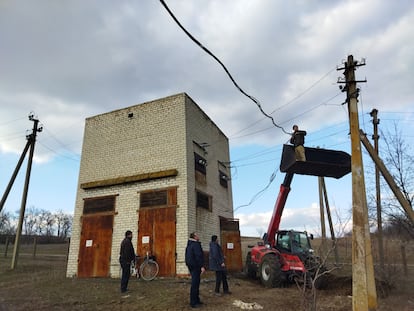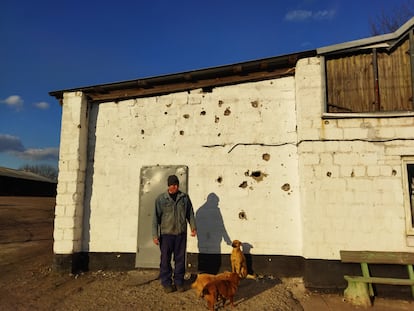No power, no water: Civilians in Donbas region feel effects of escalating Ukraine-Russia crisis
On the day that Russian President Vladimir Putin recognized two separatist regions as independent republics, EL PAÍS traveled to communities near the frontlines of the conflict to see how locals are coping


The dogs were extremely restless when Pavel Kolomoizev arrived at the farm on Sunday. The first thing that greeted him at the muddy entrance was a gaping hole where the mortar shot had dented and broken the metal fence. Inside the property, the wall of the building where the farm workers cook, rest and sometimes sleep was chipped and peppered with holes. There was no more glass in the windows. “Fortunately, I was not here that night,” noted Kolomoizev.
Wearing a black hat pulled down to his eyebrows, the 48-year-old farm operator spent all that day picking up bits of projectile, sweeping the broken glass and covering the holes with plastic sheeting. “Just when you think that you’re finally going to have peace, that things are cooling down and that we can move on, everything starts all over again,” he said, pouring a little tea from a thermos into a cup.
Villages like Krasnohorivka, located just a few miles from the frontlines, are feeling the effects of intensifying violence in the Donbas region of southeastern Ukraine, where pro-Russian separatists backed by the Kremlin and the Ukrainian army have been clashing for the last eight years. A fragile ceasefire signed in 2019 (the umpteenth one) has been constantly violated, and there have been attacks ever since the conflict began in 2014, according to an observer mission sent by the Organization for Security and Co-operation in Europe (OSCE). But the situation has become “much worse” since Thursday of last week, said Vasili Grebinik, a 73-year-old retired miner who lives in the area.
Officials in the Ukrainian capital, Kyiv, on one side and the secessionist leaders of the Donetsk and Luhansk areas on the other have been blaming each other for the bombings. Two civilians died on Monday in two attacks in Novoluhanks, within Ukrainian-controlled territory. On Sunday, the heads of the self-proclaimed “Popular Republics” of Donetsk and Luhansk, in the Donbas, announced the death of two more civilians. They also accused the government of Ukrainian President Volodymyr Zelenskiy of sabotaging critical infrastructure and of planning an attack to take back the entire region. Kyiv denied this and said it’s a carefully planned operation by the Kremlin to start an incursion into the separatist regions, which Russian President Vladimir Putin on Monday recognized as independent republics, arguing that their populations must be protected from what his own security aides have described as “a Nazi regime.”

With political statements picking up speed and diplomatic talks moving into high gear in a bid to de-escalate a rapidly ballooning crisis, the bombing of the Donbas region continues unabated. Projectiles have already brought down power lines and damaged pipes in the towns closest to the frontlines. In Krasnohorivka, a farming village, local residents have been without electricity since Sunday. Víktor, the foreman at a kolkhoz (a collective farm), and several neighbors were attempting to fix the cables and the transformer themselves, aided by a tractor with a front loader bucket. “We can’t be without light, without refrigerators; some people don’t even have heating,” said Víktor.
There is nothing left of the wealth once on display in the Donbas, an industrial and mining region that was an important driver of economic growth during Soviet times. The latest war in Europe has already claimed around 14,000 lives from both sides and forced over 1.5 million people to leave their homes. The conflict is also bleeding the economy of eastern Ukraine and of the country as a whole. The landscape has been scarred by projectiles and is dotted with abandoned buildings. There is also a lot of land lying fallow, according to Alexander Vasilievich, who used to work for an agricultural company. “Everything is in such bad shape that it’s hard to see which are the old shot marks and which are the new,” he said, shrugging. A detonation went off in the distance, but Vasilievich did not even flinch.

The city of Marinka, in the Donetsk Oblast (province), was the scene of intense fighting at the beginning of the war and it briefly came under separatist control for a couple of days. On Monday, Luba Vetrova and a group of friends were having a lively conversation on the benches of a city park, soaking in the rays of the winter sun. “What else can we do, there’s no electricity at home,” said Vetrova, 69. All the women sounded furious, blaming the government for the war and the escalation of violence. They said that everything would be better if the Ukrainian soldiers would just go away, and even suspected that Ukraine, not Russia, might have been behind some of the projectiles targeting the city. “Whether accidentally or not, all I know is that my roof has been broken four times. Whoever it was, we’re right in the middle,” said one of the women. Vetrova, who lives off a modest pension, said she misses the days of the Soviet Union when she could afford to go on vacation to the Black Sea or to Baku, the capital of Azerbaijan. “I haven’t been out of here for two decades,” she lamented.
Tamara Mavrova was also feeling a bit nostalgic, but in her case, it was for the city that might have been but whose future was cut short by the war. “Last year the circus came to town and we bought tickets for my granddaughter,” she explained. “But there were several attacks and they were unable to perform.” Mavrova, 70, used to work in a small retail store until it was shut down because of the war. For the last two days, she has been without electricity or running water. Her house is filled with candles, flashlights and large water bottles. “At the start of the war, we moved in with relatives in a different area. But we are elderly and we don’t know where to go,” she said. Despite the years that have gone by, she still can’t get used to the sound of the bombs. “When it comes, I bite my tongue and I sit to wait until it goes away.”
Tu suscripción se está usando en otro dispositivo
¿Quieres añadir otro usuario a tu suscripción?
Si continúas leyendo en este dispositivo, no se podrá leer en el otro.
FlechaTu suscripción se está usando en otro dispositivo y solo puedes acceder a EL PAÍS desde un dispositivo a la vez.
Si quieres compartir tu cuenta, cambia tu suscripción a la modalidad Premium, así podrás añadir otro usuario. Cada uno accederá con su propia cuenta de email, lo que os permitirá personalizar vuestra experiencia en EL PAÍS.
¿Tienes una suscripción de empresa? Accede aquí para contratar más cuentas.
En el caso de no saber quién está usando tu cuenta, te recomendamos cambiar tu contraseña aquí.
Si decides continuar compartiendo tu cuenta, este mensaje se mostrará en tu dispositivo y en el de la otra persona que está usando tu cuenta de forma indefinida, afectando a tu experiencia de lectura. Puedes consultar aquí los términos y condiciones de la suscripción digital.








































